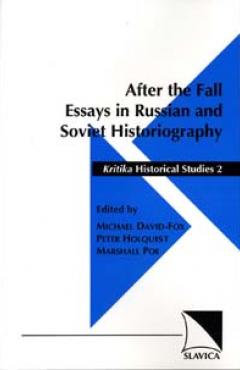Peter Holquist's teaching and research focus upon the history of Russia and modern Europe. He is the author of Making War, Forging Revolution: Russia's Continuum of Crisis, 1914-1921 (Harvard, 2002). He is founder and served for ten years as editor of the journal Kritika: Explorations in Russian and Eurasian History and serves as editor for the Kritika Historical Studies. In 2010, he was a co-recipient of the “Distinguished Editor” Award from the Council of Editors of Learned Journals for work on the journal Kritika: Explorations in Russian and Eurasian History. Holquist has published articles on Russia 's experience in the First World War and Russian Revolution, questions of continuity and change from the imperial period into the Stalin era, and other topics.
Holquist's current project, By Right of War, explores the emergence of the international law of war in the late nineteenth and early twentieth century. Specifically, it analyzes the role of imperial Russia in codifying and extending these "laws and customs of war," and examines to what extent European militaries, and particularly the Russian army, observed these norms in practice. This project encompasses two distinct areas of analysis. First, it traces how international law emerged as a discipline in Imperial Russia and came to flourish there. This is a story of intellectual and diplomatic history. The second half of the project measures the extent to which these normative principles shaped actual policy. It takes the form of military and political history, examining the Russian army in three cases of military occupation: Bulgaria and Anatolia in 1877-78; Manchuria during the Boxer Rebellion, 1900-1901; and in Austrian Galicia, East Prussia, and the Ottoman eastern provinces during the First World War. The project, in other words, asks by what means, and to what degree, can one bring people's conduct, even in extremis, into line with normative and ethical prescriptions?
Holquist received his Ph.D. with distinction from Columbia University in 1995. Prior to joining Penn's History Department in Fall 2006, he taught for nine years at Cornell University. He offers lecture courses on imperial Russia the Soviet Union, Europe in the nineteenth century, and on the First World War; and undergraduate seminars on "Russia in the Age of Anna Karenina" and a Ben Franklin Seminar on the First World War.
Member of the Penn Russian, East European and Eurasian Studies Group
Students interested in applying for PhD in Russian imperial and Soviet History
Holquist works with graduate students in the fields of Russian history, Soviet history, and the history of modern Europe. Applicants to the graduate program in any of these sub-fields are encouraged to contact Prof. Holquist via email (see above) before the application deadline. If you are having any difficulty with the the UPenn PhD application portal due to war, civil conflict or natural disaster, or due to your citizenship or country of origin, please feel free to write to me immediately.
Publications
- “The Russian Revolution as Continuum and Context and Yes,—as Revolution,” Cahiers du monde russe 58, no. 1/2 (2017): 179-92
- “Okkupatsionnaia politika Vremennogo Pravitel’stva kak osvobozhdenie: na primer ‘Turetskoi Armenii’” [“The Occupation Politcy of the Russian Provisional Government as a Form of Liberation: The Case of ‘Turkish Armenia’”], in Epokha voin i revoliutsii, 1914-1922: Materialy mezhdunarodnogo kollokviuma (St. Petersburg: Nestor, 2017), pp. 248-63.
- “Bureaucratic Diaries and Imperial Experts. Autobiographical Writing in Tsarist Russia in the late Nineteenth Century: Fëdor Martens, Dmitrii Miliutin, Pëtr Valuev,” in Imperial Subjects. Autobiografische Praxis in den Vielvölkerreichen der Habsburger, Romanovs und Osmanen im 19. und frühen 20. Jahrhundert, eds.Martin Aust and Frithjof Benjamin Schenk (Böhlau Verlag: Köln, 2015), pp. 205-232.
- “The World Turned Upside Down: Refugee Crisis and Militia Massacres in Occupied Northern Persia, 1917-1918,” in Le Génocide des Arméniens: Cent ans de recherché, 1915-2015, ed. Conseil scientifique international pour l’étude du génocide des Arméniens (Paris: Armand Colin, 2015), pp. 130-54.
- "‘In accord with State Interests and the People's Wishes': The Technocratic Ideology of Imperial Russia's Resettlement Administration," Slavic Review 69, no. 1 (Spring 2010), 151-79. (Posted in accordance with Slavic Review's web-posting policy.)
- “Violent Russia, Deadly Marxism: Russia in the Epoch of Violence,” Kritika: Explorations in Russian and Eurasian History 4, no. 3 (Summer 2003): 627-52. (Posted with the permission of Kritika.)
- “‘Information is the Alpha and Omega of Our Work': Bolshevik Surveillance in its Pan-European Perspective,” Journal of Modern History 69, no. 3 (1997): 415-450. (Posted in accordance with the on-line posting policy of the Journal of Modern History.)
- Introduction to Making War, Forging Revolution: Russia's Continuum of Crisis, 1914-1921
Suggested Readings for PhD Comprehensive Exams
Suggested Readings for PhD Qualifying Exam in Soviet History (PDF)
Suggested Readings for PhD Qualifying Exam in Imperial Russia (PDF)
Teaching Awards
- Ira H. Abrams Memorial Award for Distinguished Teaching, School of Arts and Sciences, University of Pennsylvania, April 2018.
- Richard S. Dunn Award for Distinguished Teaching, History Department, University of Pennsylvania, Spring 2017
- Robert and Helen Appel Fellowship for Humanists and Social Scientists, recognizing “excellence in teaching, scholarly promise, and dedication to advancing knowledge,” Cornell University, 2004
Ph.D. in History, Columbia University (awarded with Distinction)
BA in History and in Slavic Languages and Literatures, Indiana-University-Bloomington (awarded with High Distinction)
- HIST 048 Imperial Russia, 1689-1905
- HIST 049 The Soviet Century, 1905-2005
- HIST 102 Freshman Seminar: Russia in the Age of Anna Karenina
- HIST 212 Ben Franklin Seminar: The First World War
- HIST 333 The Napoleonic Era andTolstoy's War and Peace
- HIST 425 World War I: Causes, Course, Consequences
- HIST 620 Issues and Themes in the History of Imperial Russia


